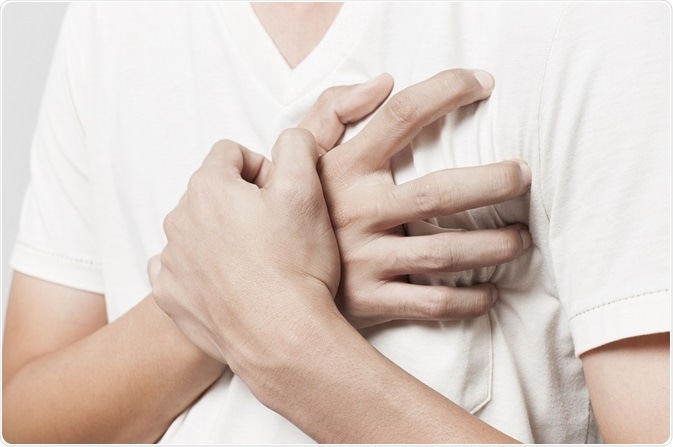Takotsubo cardiomyopathy (TCM) is a serious heart condition, also known as stress-induced cardiomyopathy or broken heart syndrome. It is unique in up to 75-85% of patients with this condition, it is triggered by a stressful event, which occurs from minutes to hours before the onset of clinical symptoms. In 15-25% of patients there is no identifiable stress trigger. The stressors may be classified as emotional and physical.

Credit: Kunlanan Yarist/ Shutterstock.com
Emotional stressors
Psychological stressors are associated with emotional stressful events that lead to extreme grief, irritation, anger, and depression in a person without the involvement of any physical element. These stressors range from less intense to severe and acute emotional events. It can also be a negative emotion or an extreme positive emotion. These are found in about 40% of patients, and include:
Severe emotional stressors:
Extreme emotional stressors such as accidents, conflicts, deaths, and life-changing events are considered as the major triggers for takotsubo cardiomyopathy. Some other acute emotional stressors are:
- unexpected bereavement
- fear of public speaking or due to armed assault
- divorce and other serious relationship conflicts
- financial crises such as losses at gambling or loss of one’s job
- severe injury to a family member, a friend, or a pet
- serious argument within a relationship
- losing or even winning a lot of money
- diagnosis of cancer
- receiving bad news such as daughter’s divorce, or of a family member going into battle
Less intense emotional stressors:
Some less severe emotional stressors responsible for broken heart syndrome could be:
- moving to a new residence
- an unexpected celebration
- being jobless or losing/winning a lot of money suddenly, e.g., by gambling
Takotsubo Cardiomyopathy: I am Seeing it Everywhere!
Neuropsychiatric stress
An interesting finding from recent research is that over half of patients with TCM have a current or former neuropsychiatric disorder, either acute or chronic. This is strongly correlated with the previous research showing that TCM occurs in patients with subarachnoid hemorrhage or ischemic stroke, epilepsy, head injury, severe anxiety or depression. Physiologic backing for this comes from the anatomical location of neurons which are responsible for vasoconstriction. These are located in the brain stem, and thus their incapacitation may well cause dysfunction of the microvasculature in the heart muscle, producing the typical myocardial stunning of TCM – neurogenic myocardial stunning. Identical histopathologic results are obtained from the cardiac muscle examination of patients who died with TCM, hemorrhagic stroke, or epilepsy. Conversely, patients with TCM are much more likely to have neuropsychiatric disorders than others.
Physical stressors
The physical stressors triggering TCM are found in over 27% of patients, and they include:
General causes
- falls in older adults
- convulsions
- spinal cord injury
- ischemic stroke or one due to subarachnoid hemorrhage
- narcotic or alcohol withdrawal
- severe burns
- lightning strike
- near drowning
- stings and heat strokes
Surgical procedures
- General surgical procedures such as hysterectomy, cesarean section, colonoscopy, difficult urethral catheterization, and cholecystectomy
- Cardiac procedures such as pacemaker implantation, radiofrequency ablation for cardiac arrhythmia, pancreatitis, cardiac arrest, or electrical cardioversion for atrial fibrillation
Medical conditions:
- Respiratory system: chronic obstructive pulmonary disorders, pneumothorax and pulmonary embolism, asthma
- Endocrine system: syndrome of inappropriate antidiuretic hormone secretion, Addison’s disease, severe hypothyroidism, pheochromocytoma, multiple endocrine neoplasia, and deficiency of adrenocorticotropin hormone.
- Connective tissue disorders
- Gastrointestinal system: acute pancreatitis, severe diarrhea or vomiting, pseudomembranous colitis, peritonitis, and biliary colic.
- Renal and hematology: blood transfusion, vascular thrombosis and hemodialysis.
Certain tests
These include the dipyridamole stress test, dobutamine stress echo, and the exercise stress test.
Chemical stressors
Some powerful chemicals cause metabolic imbalance or disruption which prevents normal physiological functioning. These include:
- Cocaine—a powerful stimulant drug
- Duloxetine (Cymbalta)—a medication typically used in major depression, neuropathic pain, and fibromyalgia
- Epinephrine, also known as adrenalin, for life-threatening allergic reactions
- Venlafaxi (Effexor)—an antidepressant drug used in major depressive disorders, and fear and panic attacks
- Levothyroxine—a drug used in hypothyroidism
- Nortriptyline used to treat clinical depression
- Albuterol or Salbutamol which are bronchodilators
- Adderall, a highly addictive prescription drug to optimize individual performance before any event
Absolute stressors
This term is used for specific events such as catastrophic natural disasters which may precipitate a high incidence of TCM in that geographical area. For example, during the year 2004, a huge earthquake occurred in Niigata, Japan, which resulted in 25 cases of TCM over the subsequent four weeks. The majority occurred within a day of the quake, and most others within a week. This phenomenon has been reported in many other places following similar stimuli.
As already stated, over a third of patients suffering from takotsubo cardiomyopathy are found to have no stressors. Chronic overwhelming stress such as being victimized constantly by prevailing social structures can also predict a higher risk for TCM.
Again, postmenopausal women are known to be predisposed to depression, and this is the category which accounts for most cases of TCM. Stress thus produces acute elevations in catecholamine release which causes the myocardium to become hypokinetic through mechanisms undetermined as of yet.
Further Reading
Last Updated: Mar 13, 2023